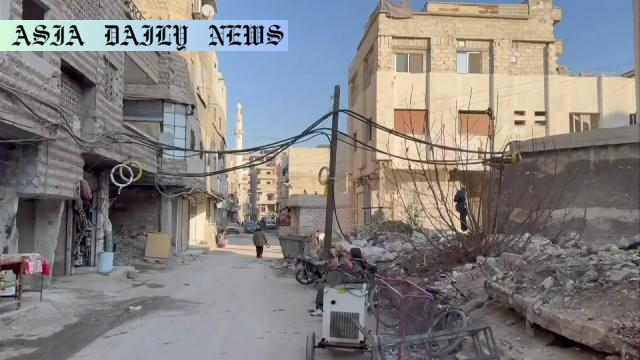Russia delegation visits Syria for first talks with interim government leader
Russia delegation visits Syria for the first time in years.
Talks focus on bilateral relations, bases, and Assad’s status.
Both nations agree to keep discussing military base strategies.

Introduction: A Rebuilding of Diplomatic Ties
For the first time since the fall of former Syrian President Bashar al-Assad, a Russian government delegation has held high-profile talks in Damascus. This historic meeting between Deputy Foreign Minister Mikhail Bogdanov and the Syrian interim leader Ahmed al-Sharaa opens a new chapter in the relationship between two countries with longstanding ties, specifically in the context of shifting political landscapes and challenges in the region.
The Historic Visit: Marking a Shift in Bilateral Relations
The Russian delegation’s visit, led by Deputy Foreign Minister Mikhail Bogdanov, represents a significant moment in bilateral relations between the two countries. The discussions touched on various matters, including the long-standing military cooperation carried out through Russian bases in Syria. Additionally, the meeting underscored Moscow’s commitment to maintaining its strategic foothold in Syria—particularly through the naval facility in Tartous and the airbase in Hmeimim.
Key Talking Points: Humanitarian Aid and Mutual Collaboration
The meeting also highlighted discussions about potential humanitarian aid deliveries through Russian bases in Syria. President Vladimir Putin reportedly proposed that the military installations in Tartous and Hmeimim could serve dual purposes, providing logistical support for critical aid to regions affected by the ongoing Syrian crisis. Officials from both sides acknowledged the importance of continuing consultations regarding the bases and their function in current and future strategic collaborations.
Ahmed al-Sharaa’s Request: Seeking Accountability
According to sources, Ahmed al-Sharaa raised a bold yet understandable inquiry, asking Russian officials about the possibility of handing over ousted leader Bashar al-Assad, who had fled to Russia after losing power. Although the details of this discussion remain confidential, its inclusion signifies the ongoing complexities surrounding Assad’s role and the future political stability of Syria.
Analysis: The Implications of Russia’s Role in Syria
Russia’s involvement in Syria over the past decade has been a cornerstone of the geopolitical dynamic in the Middle East. By maintaining two critical bases in the region, Russia has demonstrated its strategic intent to remain a central player in Middle Eastern affairs. This meeting furthers Moscow’s approach to regional diplomacy, balancing military strength with contributions to humanitarian efforts.
The Potential Road Ahead for Moscow-Damascus Relations
This historic engagement may potentially shift the narrative in Syria’s diplomatic history. By emphasizing mutual collaboration and strategic discussions about humanitarian aid, both sides aim to foster a sense of stability and progress. However, challenges remain, particularly around Assad’s issue and the geopolitical balancing act involving other influential actors in the region, such as the United States, Turkey, and Iran.
Conclusion: A Step Toward Geopolitical Realignment
In all, the landmark visit by the Russian delegation is a crucial moment in the evolving relationship between Moscow and Syria. Through candid discussions, new strategies for their collaboration have emerged, potentially paving the way for further developments that could influence regional and global politics. While much remains to be settled, this meeting underlines a commitment to continued dialogue aimed at shaping the future trajectory of their partnership.



Commentary
A Historical Turning Point in Russian-Syrian Relations
The recent visit of a Russian delegation to Syria marks a noteworthy shift in the geopolitics of the region. For years, Russia has been a steadfast ally to the Assad administration, utilizing its military bases to project power and build influence in the Middle East. This trip symbolizes Moscow’s willingness to adjust to a new phase in Syria’s political landscape, one that considers the emergence of an interim government. It also highlights Russia’s ability to be adaptable and relevant as it continues to mold its foreign policy to fit changing realities.
Assad’s Future: An Ongoing Question
One of the most intriguing dimensions of this visit is Ahmed al-Sharaa’s appeal for Assad’s extradition. If indeed Russia ponders this request, it would have tremendous implications for both Syrian domestic politics and Russia’s global standing. On one hand, it could present Russia as a responsible power willing to prioritize stability over individual allegiances. On the other, such an act would jeopardize decades of trust and partnership forged between Assad and Moscow. This dilemma underlines the delicate tightrope Russia is walking as it navigates its role in Syria.
Russia’s Strategic Advantage
Despite challenges, Russia has emerged as a resilient power broker in Syria. By retaining control of the crucial Tartous naval base and the Hmeimim airbase, it cements its position as a formidable player in the region. These installations serve military purposes, but their proposed function as routes for humanitarian aid could also boost Moscow’s international image. It’s a clever strategy that allows Russia to project both hard and soft power, reaffirming its relevance beyond battlefield maneuvers.